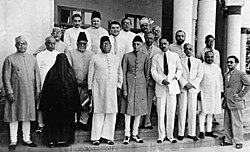قرار لاهور
قرار لاهور

قرار لاهور، والمعروف أيضا باسم «قرار باكستان»، [1] هو بيان رسمي سياسي اعتمدته رابطة مسلمي عموم الهند أثناء دورة الثلاثة أيام في لاهور ما بين 22 و24 مارس من عام 1940، والذي دعا لإنشاء «دولة مستقلة» للمسلمين في شمال غرب وشرق الهند البريطانية. وقد كانت المقاطعات المكونة للهند ستكون مستقلة وذات سيادة.[2] قدم القرار فضل الحق، رئيس وزراء ولاية البنغال. وفسر لاحقا بأنها طلب إقامة دولة إسلامية منفصلة واحدة، تدعى باكستان.[3]

على الرغم من أن اسم «باكستان»، كان قد اقترحه شودري رحمة علي في كتابه إعلان باكستان [4] في عام 1933، إلا أن محمد علي جناح وغيره من القادة تمسكوا باعتقادهم في الوحدة بين الهندوس والمسلمين.[5] ولكن المناخ السياسي المتقلب أعطى دعما أقوى لفكرة قيام دولة للمسلمين.[6]
المراجع[عدل]
- ^ Francis Robinson (1997), The Muslims and Partition, History Today, Vol. 47, September
- ^ "Do we know anything about Lahore Resolution?". Alarabiya.net. 24 مارس 2009. مؤرشف من الأصل في 2017-08-25. اطلع عليه بتاريخ 2013-06-02.
- ^ Christoph Jaffrelot (Ed.) (2005), A History of Pakistan and Its Origins, Anthem Press, ISBN 978-1-84331-149-2
- ^ Choudhary Rahmat Ali, (1933), Now or Never; Are We to Live or Perish Forever?, pamphlet, published January 28. (Rehmat Ali at the time was an undergraduate at the جامعة كامبريدج)
- ^ Ian Talbot (1999), Pakistan: a modern history, St. Martin's Press, ISBN 0-312-21606-8
- ^ Reginald Coupland (1943), Indian Politics (1936–1942), Oxford university press, London



